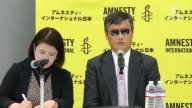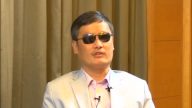【新唐人2012年12月03日訊】11月30號,山東沂南當局在一次突然舉行的庭審中,判處盲人維權人士陳光誠的侄子陳克貴有期徒刑3年3個月。這引發各界強烈不滿。陳克貴的父親陳光福指責判決不公,認為當地官員深夜闖入民宅,陳克貴被迫用菜刀反抗,屬於正當防衛。美國國務院也批評說,陳克貴案的審理過程充滿漏洞,中共當局應該重新審理。
陳克貴的父親陳光福向《新唐人》透露,開庭的前一天晚上,他曾經詢問陳克貴的官方指定律師,是否有開庭消息,對方回答沒有。但30號上午10點半以後,律師突然打來電話說,案件將在下午兩點鐘開始審判。
陳光誠兄 陳光福:「一點半左右,我們趕到了縣法院門口,要求旁聽。但是被眾多的便衣、公安阻止,他們不讓我去參加旁聽。(我們)連法院的大門也沒有進去。」
陳光福指責,目前的判決結果非常不公平。
陳光福:「他(陳克貴)五更半夜的正在睡覺,面對翻牆入室、打砸搶者,他完全是一種正當防衛。但是卻以『故意傷害』被判處3年3個月的徒刑。這我們很難接受。」
今年(2012年)4月,山東著名盲人維權人士陳光誠成功從家中出逃,脫離軟禁,這讓當局非常惱怒。當地鎮長張健深更半夜帶領打手持棍棒、翻牆闖入陳光誠的侄子陳克貴家,並毆打他,陳克貴被迫防衛,用菜刀將張健砍傷。隨後,沂南縣當局以「故意殺人罪」逮捕起訴陳克貴,後來在外界的關注與抗議下,把罪名改為「故意傷害」。
目前身在美國的陳光誠對《美國之音》表示,突擊審判陳克貴並不是沂南縣自行決定,而是級別很高的上層旨意。這一判決結果,也讓他對中共新領導層所謂的「新政」失望。陳光誠揭示,2005年他遭受迫害坐牢時,是現任中共政治局常委張高麗擔任山東省委書記。現在的判決說明,張高麗在包庇山東官員的「犯罪活動」,所以一當上常委就開始繼續對他和家人迫害。
美國國務院發言人努嵐,也批評中共不遵守國際承諾和人權宣言。她指出,陳克貴被判刑的過程充滿漏洞、缺乏基本的正當程序,陳克貴不但無法決定自己的辯護律師,連官方指定律師都拒絕向陳克貴家人提供案件的相關信息。美國國務院敦促中共當局重新審理此案。
北京律師 劉曉原:「這個案子,程序上我們始終認為有問題。案件一開始,家屬聘請律師它不讓。並且這個案件是當庭宣判的,這種情況也很少,在司法實踐中,一個刑事案件當庭宣判,這種案例非常非常少。」
北京律師劉曉原認為,當局之所以罕見的當庭宣判,很可能是擔心外界的關注與壓力。基於同樣的擔憂,當局也沒有遵守開庭前三天通知被告人家屬的規定,直到開庭前不足4小時,才匆忙告知陳克貴家人。
對於媒體報導陳克貴當庭表示不上訴,劉曉原分析,這很可能不是陳克貴的自由選擇。
劉曉原:「很有可能被告人是受到了壓力。再一個,(官方)指定律師也沒有給他分析這個案件的實際情況。往往有些律師會說:你這個問題很嚴重,你不要上訴,上訴會更麻煩。會給他施加壓力。」
劉曉原還表示,雖然中共「十八大」之後,重慶方面有一些當年薄熙來製造的冤案出現翻案跡象。但這只是個案,全國更多的冤案並沒有得到處理,看不到中國大陸法制上有任何進步。
採訪/劉惠 編輯/李謙 後製/鍾元
Chen Guangcheng’s Nephew Sentenced to 3 Years and 3 Months in Jail
On Nov. 30, authorities in Linyi, Shandong Province
unexpectedly held a court trial, convicting Chen Kegui.
Chen Kegui is the nephew of the renowned
blind rights activist Chen Guangcheng.
This verdict has aroused strong
public discontentment and protests.
Chen Kegui’s father accused the judgment of being unfair,
as Chen acted in self-defense, after facing violent intrusion.
The U.S. Department of State has criticized that the trial
and verdict of Chen Kegui, for lacking basic due process.
The Chinese Communist Party(CCP)
authorities were called on to review the case.
Chen Kegui’s father, Chen Guangfu, revealed
that the night before the trial,
he asked the court-appointed lawyer about the court date.
The lawyer expressed that there was no any news.
However, after 10:30 am on Nov. 30, the lawyer suddenly
informed him that the case would go to trial at 2pm that day.
Chen Guangfu: “We arrived outside the County Court
around 1:30 pm, and requested to attend the trial.
But numerous plainclothes and uniformed
policemen prevented us from entering.
We were just blocked outside the gate.”
Chen Guangfu criticized that the verdict was very unfair.
Chen Guangfu: “Chen Kegui was sleeping when they
broke into his house at midnight and smashed everything.
He just acted in self-defense, but was handed a jail
sentence of 3 years and 3 months. We can’t accept it.”
In April this year, blind rights activist Chen Guangcheng
successfully fled his own house arrest in Shandong.
This heavily irritated the local CCP authorities.
At midnight, local town mayor Zhang Jian, leading thugs
armed with sticks, broke into the house of Chen Kegui.
The intruders even beat Chen Kegui, who was forced
to defend himself by slashing and injuring Zhang Jian.
Subsequently, local CCP authorities arrested
Chen Kegui and sued him for “intentional homicide.”
Under strong public pressure, the charge
was later changed to be “intentional injury."
Voice of America reported Chen Guangcheng’s
views on the issue, who now lives in the U.S.
Chen Guangcheng believes that the hasty trial
was an instruction from high-level CCP leadership.
The court decision made him disappointed with the
“new governance” of the new CCP leadership team.
In 2005 when Chen Guangcheng was imprisoned
in Shandong, the provincial Party chief was Zhang Gaoli.
Zhang was a newly elected member of the CCP Politburo
Standing Committee at the recent 18th Party Congress.
The verdict indicates Zhang Gaoli is shielding
crimes of CCP officials in Shandong.
That is why persecution has started again on Chen
and his relatives, after Zhang’s new promotion.
U.S. State Department spokesman Victoria Nuland
criticized the CCP’s “failure to honor its international commitments” to respect human rights.
Nuland said that the trial and sentencing
of Chen Kegui was “a deeply flawed legal process”.
Chen Kegui was denied access to his choice of lawyers.
His parents were given little advance notice of the trial.
Nuland called on the CCP authorities to review the case.
Beijing Lawyer Liu Xiaoyuan: “The case is questionable.
It denied Chen’s family the right to hire a lawyer.
Chen Kegui was found guilty in court immediately
following the trial, which is very rare for judicial practice.”
Liu Xiaoyuan analyzes that the unusually quick
conviction may aim to escape public pressure.
In law, families of the accused shall be
notified three days in advance of the trial.
Yet, the court did not inform them until less
than four hours ahead of the court trial.
China’s media reported that Chen Kegui said
he would not appeal against the conviction.
Liu Xiaoyuan speculates that this may not
be out of Chen Kegui’s own volition.
Liu Xiaoyuan: “The convicted are very likely to be pressured.
Also, the court-appointed lawyer didn’t analyze the case.
Some lawyers would often say,
『This is a very serious problem
You』ll have more trouble if you
appeal against the sentences.’
They might use this method to pressure him.”
Liu Xiaoyuan commented that after the 18th Party Congress,
there are a few injustices, such as those of Bo Xilai
in Chongqing, that seem to show signs of being redressed.
These are just isolated cases, he says, as there are many
more injustices across China that haven’t been vindicated.
So far, there is no any real improvement
of justice that has been seen in China.



















